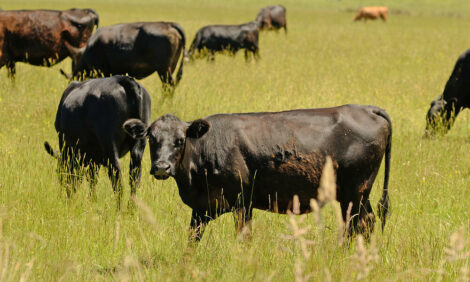



Cattle Producers Help Bird Conservation
CANADA - Canadian cattle producers have found themselves at the centre of migratory bird habitat conservation. As the world looks for ways to protect grassland birds and other threatened migratory bird populations, cattle producers across Canada have emerged as an important part of the solution.Migratory bird populations have dropped sharply worldwide, with many grassland bird species high on the list of priorities for conservation action. Beef farmers and ranchers own or manage approximately 21 million hectares of grass pastures in Canada that are also prime habitat for these birds.
Jon McCracken, a biologist and national director of Bird Studies Canada, a non-profit bird conservation organisation, listed the grassland birds in Canada that find a safe haven on cattle pasture land. The list included everything from threatened Sprague's Pipits and endangered Burrowing Owls and Bobolinks, to Western Meadowlarks and Swainson's Hawks, among over 200 different species.
"The decline of migratory birds is a global phenomenon that we are experiencing here in Canada", said Mr McCracken. "For grassland birds, the biggest issue has been the loss of grasslands, whether native prairie, rangeland or hayfields. If it weren't for the cattle industry, we'd have lost many of these threatened bird species already".
While the cattle industry provides an important economic justification for maintaining grasslands on the landscape, the activity of cattle grazing is also very important from an ecological perspective, said Dr Nicola Koper, an associate professor and researcher in terrestrial ecology at the University of Manitoba. "The cattle themselves have become an integral part of healthy grassland ecosystems, which evolved under the presence of grazers such as bison. Cattle now provide the disturbance necessary to drive ecological cycles and support biodiversity".
In general, the same good grazing management practices that support sustainable cattle production also support good bird habitat, said Dr Koper. "It's a very mutually beneficial relationship. Cattle producers overall have done an excellent job of managing their land and livestock so that there are relatively moderate grazing intensities and other beneficial conditions. Because different birds prefer slightly different types of grassland habitat, the modest variation out there in management approaches is actually good for the birds as well".
However, Dr Koper highlights that there are areas of management that require improvement. "We've come a long way in improving grazing management, for example by managing stocking densities. Supporting ongoing research is one of the best ways we can continue to improve".
Ultimately, the greatest challenge may come from economics. The economic viability of beef cattle production in Canada has been poor in recent years, leading numerous producers to exit the industry. This has raised concern among bird conservation groups, particularly in eastern Canada where the decline in beef cattle production on pasture has been most pronounced, said biologist Ron Reid, a past director of the Couchiching Conservancy who has helped lead several bird conservation efforts in Ontario.
"We need to recognise there is more at stake here and find ways to keep beef grazing viable", said Mr Reid. "I think the pathway we need to head down is toward building incentives and support programs that reward producers for the role they play as ecological stewards".
Cattle farmers are therefore encouraged to be more aware of the role they play in helping protect migratory birds and, as Lynn Grant, a Val Marie, Sask., rancher and chair of the Environment Committee of the Canadian Cattlemen's Association (CCA), states, "There's a lot of enjoyment you can get out of listening for songbirds or bird watching. It's also an excellent reminder of the job we have to do".
TheCattleSite News Desk


